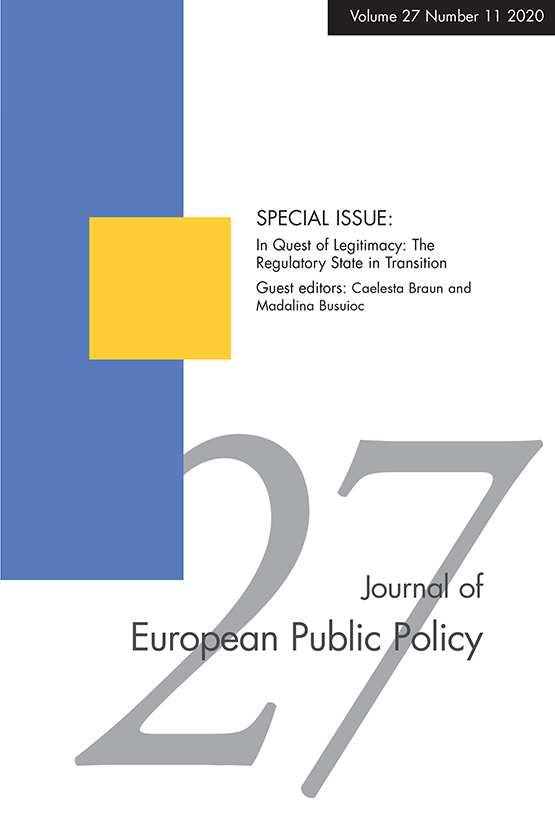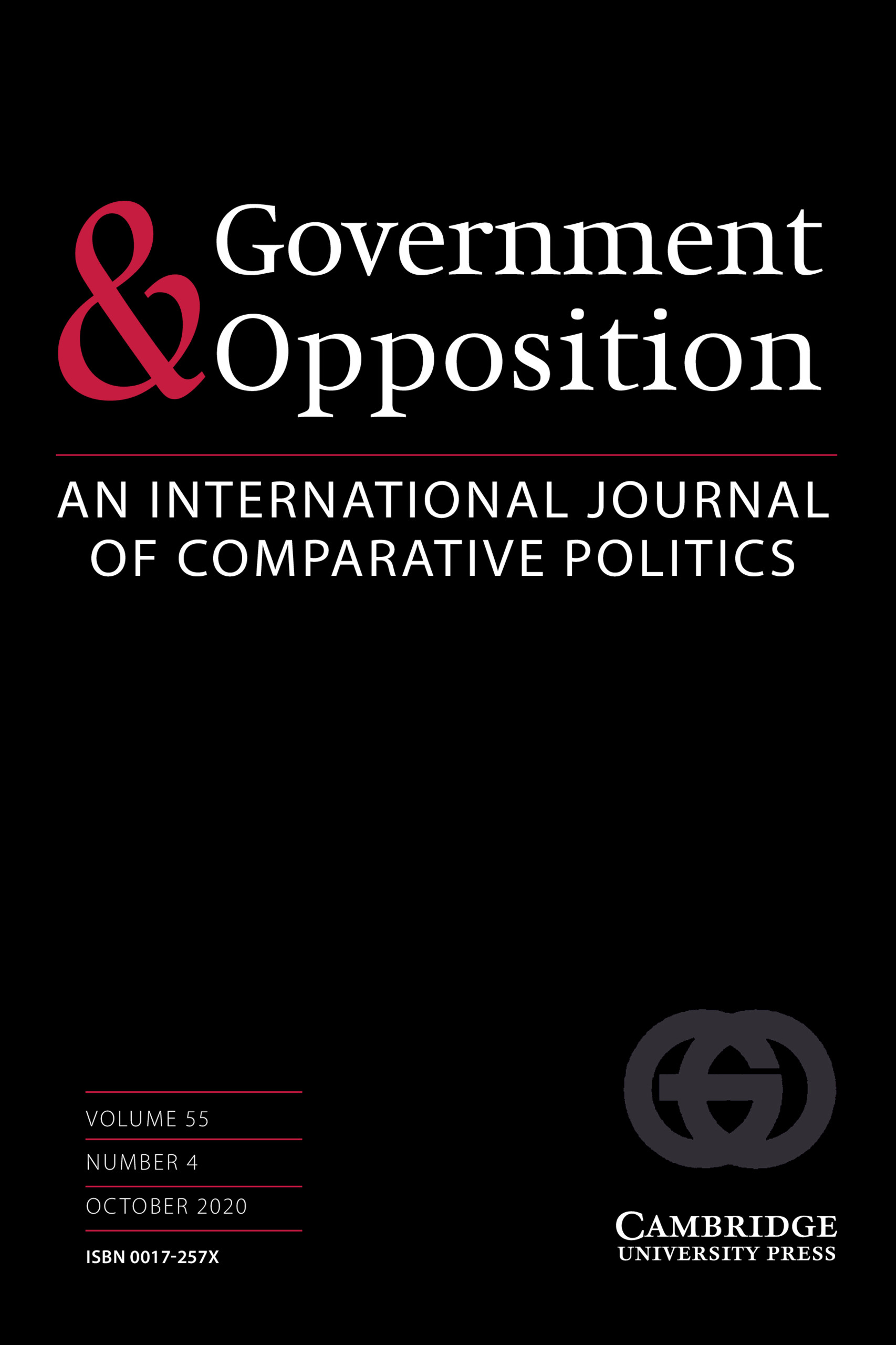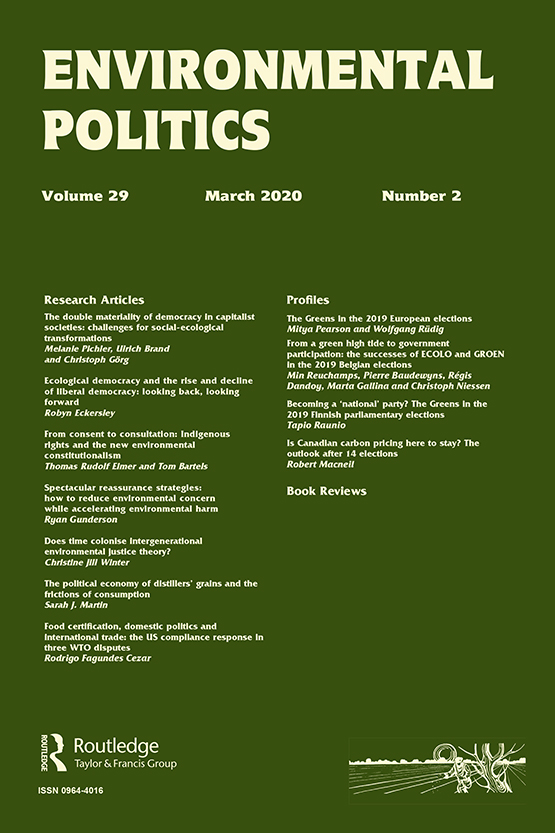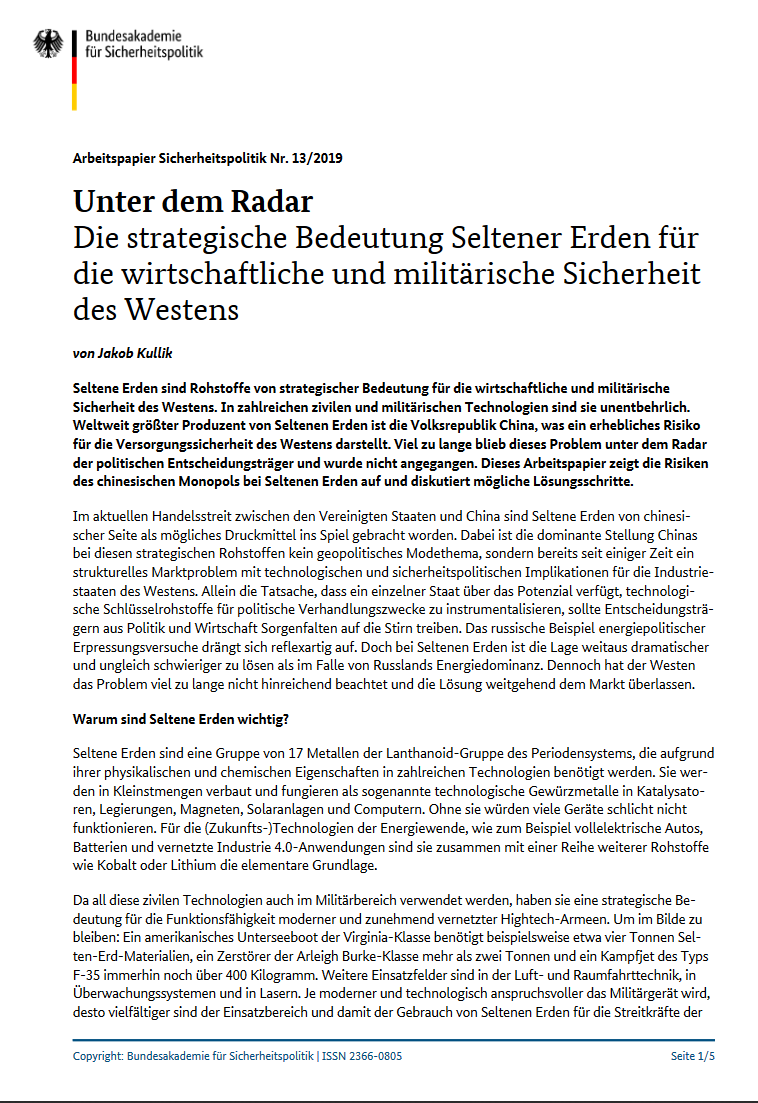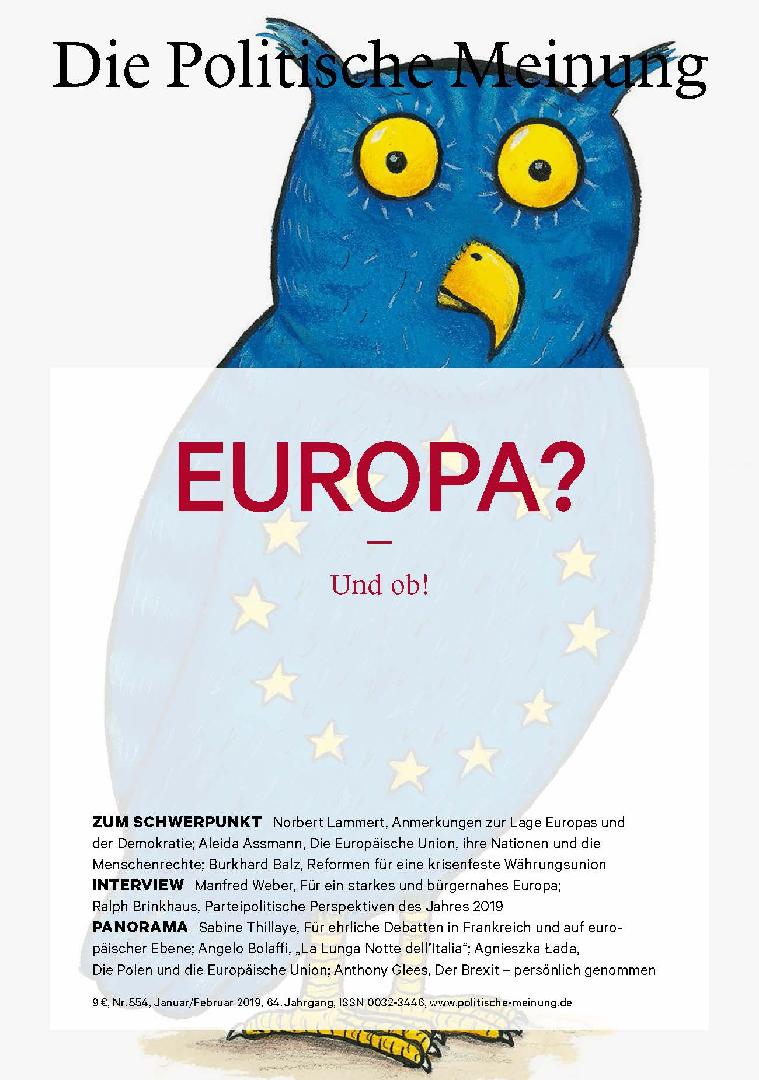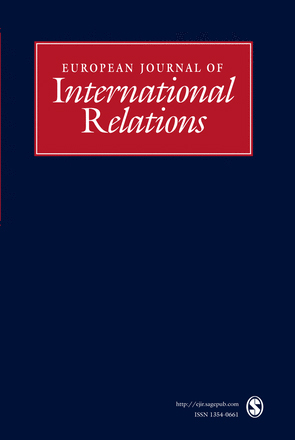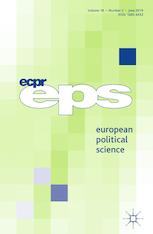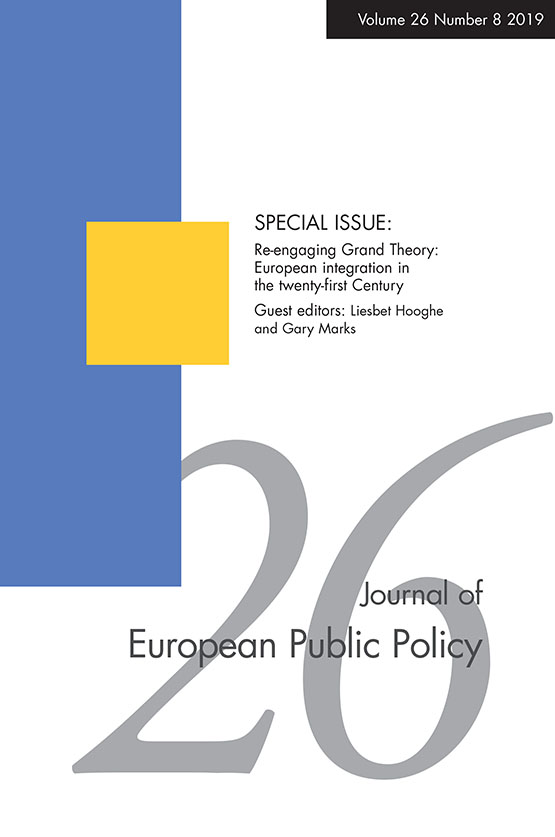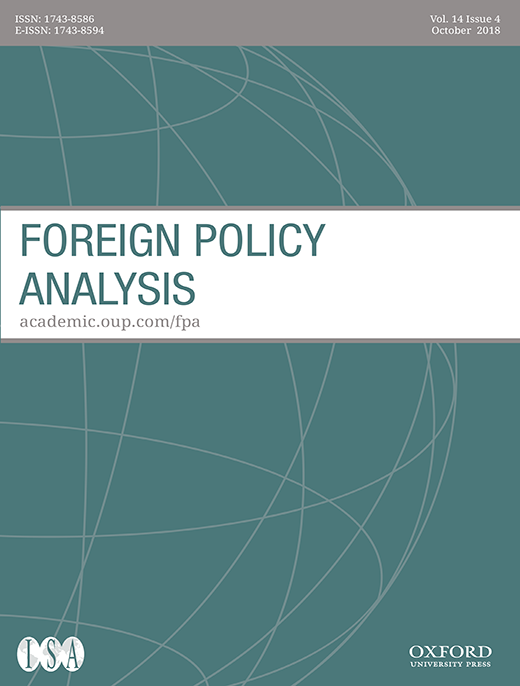Publikationen
Nötzold, Antje: Strategischer Wettbewerb im Weltraum. Politik, Recht, Sicherheit und Wirtschaft im All, Springer: Wiesbaden 2024.
Der Sammelband nimmt erstmalig seit Ende des Kalten Krieges für den deutschsprachigen Raum eine komprimierte Bestandsaufnahme der aktuellen Aktivitäten, rechtlichen Rahmenbedingungen, politischen und militärischen Konfliktlinien und Kooperationsräume sowie weiterführender Trends und Herausforderungen im Weltraum vor. Dabei werden zum einen die rechtlichen, militärischen, wirtschaftlichen und technologischen Herausforderungen des Bedeutungszuwachses dieses strategisch gewichtigen Raumes analysiert. Zum anderen werden Handlungsfähigkeit und -bedarf ausgewählter Weltraummächte, ihre Kooperationsmöglichkeiten und Konfliktpotenziale sowie der internationale politische Regulierungsbedarf herausgearbeitet und darauf aufbauend politische Handlungsempfehlungen dargelegt.
Nötzold, Antje: Entscheidung zur Denuklearisierung. Eine Prozessanalyse der nuklearen Abrüstung in Südafrika – Implikationen für die Non-Proliferationsforschung und -politik, Nomos: Baden-Baden 2023.
Im Mittelpunkt des Buches steht der Entscheidungsprozess zur Denuklearisierung in Südafrika und die internen wie internationalen Einflüsse. Ein neuer methodischer Ansatz der eklektischen fallfokussierten Prozessanalyse untersucht die Faktoren Sicherheit, internationale Institutionen und Normen, staatliche Präferenzen, nationale Identität sowie technologische Fähigkeiten hinsichtlich ihrer Effekte auf die nuklearen Entscheidungen. Damit bietet das Buch eine umfassende Analyse des südafrikanischen Nuklearprogramms im Kontext der nationalen und internationalen Umstände von den 1950er Jahren bis zur nuklearen Abrüstung. Die Ergebnisse werden im Fall Libyen überprüft sowie Implikationen für die Non-Proliferationsforschung und -politik abgeleitet.
Kai Oppermann: Foreign Policy as Public Policy? Promise and Pitfalls, Manchester, Manchester University Press, forthcoming (Co-edited with Klaus Brummer, Sebastian Harnisch and Diana Panke).
This book examines how foreign policy analysis can be enriched by 'domestic realm' public policy approaches, concepts and theories. Starting out from the observation that foreign policy has in many ways become more similar to (and intertwined with) 'domestic' public policies, it bridges the divide that still persists between the two fields. The book includes chapters by leading experts in their fields on arguably the most important public policy approaches, including, for example, multiple streams, advocacy coalition, punctuated equilibrium and veto player approaches. The chapters explore how the approaches can be adapted and transferred to the study of foreign policy and point to the challenges this entails. By establishing a critical dialogue between approaches in public policy and research on foreign policy, the main contribution of the book is to broaden the available theoretical 'toolkit' in foreign policy analysis.
Kai Oppermann: Außenpolitikanalyse, 2. Aufl., München: Oldenbourg, 2018 (Co-authored with Klaus Brummer).
Die um zwei Kapitel erweiterte Neuauflage diskutiert 12 Theorien der Außenpolitikforschung, die in drei Abschnitte untergliedert sind. Der erste Teil widmet sich den Großtheorien der Internationalen Beziehungen und arbeitet heraus, in welcher Art und Weise diese für die Analyse von Außenpolitik fruchtbar gemacht werden können. Der zweite Block diskutiert Erklärungsansätze, die außenpolitische Entscheidungen auf innenpolitische Einflüsse und Zwänge zurückführen. Die im dritten Abschnitt des Bandes behandelten Theorien richten ihren Fokus auf psychologische und kognitive Erklärungsfaktoren auf der Ebene individueller außenpolitischer Entscheidungsträger. Der Band gibt damit den aktuellen Stand der Theorieentwicklung in der Disziplin der Außenpolitikforschung wieder.
Political Mistakes and Policy Failures in International Relations, Palgrave: Basingstoke, 2018 (Co-edited with Andreas Kruck and Alexander Spencer).
This edited volume analyzes mistakes in different areas of international relations including the realms of security, foreign policy, finance, health, development, environmental policy and migration. By starting out from a broad concept of mistakes as “something [considered to have] gone wrong” the edited volume enables comparisons of various kinds of mistakes from a range of analytical perspectives, including objectivist and interpretivist approaches, in order to draw out answers to the following guiding questions: How does one identify and research a mistake? Why do mistakes happen? How are actors made responsible? When and how do actors learn from mistakes?
Kai Oppermann: Fiascos in Public Policy and Foreign Policy, Journal of European Public Policy, Special Issue, 23 (5) (2016) (Co-edited with Alexander Spencer).
The collection brings together scholars from Public Policy and Foreign Policy to address the theme of policy fiascos. So far research on failure and fiascos in both Public Policy and Foreign Policy has existed independent of each other with very little communication between the two sub-disciplines. The contributions aim to bridge this divide and bring the two sides into a dialogue on some of the central issues in the study of fiascos including how to define, identify and measure policy failure (and success); the social and political contestation about what counts as policy fiascos; the causes of policy fiascos and their consequences; the attribution of blame; as well as processes of learning from fiascos. A common theme of the collection is to explore different epistemological and methodological approaches to studying policy fiascos.
Wolfram Hilz/Antje Nötzold (Hrsg.): Die Zukunft Europas in einer Welt im Umbruch. Festschrift zum 65. Geburtstag von Prof. Dr. Beate Neuss, Wiesbaden 2018.
In dieser Festschrift stehen die drei großen Forschungsfelder von Beate Neuss im Mittelpunkt: Europäische Integration, transatlantische Beziehungen und aktuelle Sicherheitsherausforderungen. Die Autorinnen und Autoren des Sammelbandes, Praktiker und Wissenschaftler unterschiedlicher Disziplinen, analysieren Aspekte, die angesichts der aktuellen Entwicklungen innerhalb der Europäischen Union, an ihrer Peripherie und im transatlantischen Verhältnis im wissenschaftlichen und öffentlichen Diskurs hochaktuell sind. Neben den Herausforderungen für die deutsche Politik und die europäische Ebene werden auch die Wechselwirkungen in der EU, zwischen den transatlantischen Partnern und bei spezifischen Sicherheitsherausforderungen beleuchtet. Darüber hinaus werden aktuelle Veränderungen in Deutschland und dessen sich verändernde Rolle in Europa und der Welt angesprochen.
Beate Neuss/Antje Nötzold (Hrsg.): Türkei - Schlüsselakteur für die EU? Eine schwierige Partnerschaft in turbulenten Zeiten, Baden-Baden 2018.
Der Tagungsband zur internationalen und interdisziplinären Konferenz vom Mai 2017 analysiert den Stand und die Perspektiven der türkisch-europäischen Beziehungen aus dem Blickwinkel beider Akteure. Neben dem Stand des EU-Beitrittsprozesses des Landes sowie der innenpolitischen Entwicklungen in der Türkei seit dem Putschversuch vom Juli 2016 werden mit dem Flüchtlingsabkommen, der Kooperation mit Ankara in EU und NATO sowie dem deutsch-türkischen Verhältnis prägende Aspekte der Beziehungen en détail betrachtet. Darüber hinaus bietet der Band eine Untersuchung der türkischen Politik im Hinblick auf regionale sicherheitspolitische Herausforderungen wie die Kurdenproblematik und den Syrien-Konflikt. Neben deutschen Türkei-Experten und Autoren, die lange in der Türkei gelebt haben, tragen auch türkische Autoren zu einer umfassenden Analyse der EU-Türkei-Beziehungen im aktuellen Kontext bei.
Beate Neuss/Antje Nötzold (eds.): The Southern Mediterranean. Challenges to the European Foreign and Security Policy, Baden-Baden 2015.
Der Tagungsband zur internationalen und interdisziplinären Konferenz 2014 analysiert mit Blick auf die Umbrüche in den Ländern des südlichen Mittelmeers die Herausforderungen der Europäischen Außen- und Sicherheitspolitik. Neben einer Bilanz der Europäischen Nachbarschaftspolitik und der Erfahrungen des Europäischen Auswärtigen Diensts in den Ländern der südlichen Peripherie werden die sozio-ökonomischen und sozialen Dynamiken sowie die Bedeutung gesellschaftlicher Akteure, insbesondere islamistischer Gruppen für die Entwicklungen der Region und die EU Politik untersucht. Darüber hinaus integriert der Band die Perspektiven der Türkei und Israels auf die Entwicklungen in der Region..
Beate Neuss / Hildigund Neubert (Hrsg.): Mut zur Verantwortung : Frauen gestalten die Politik der CDU, Köln 2013.
Anfangs noch reduziert auf Frauen- und Familienpolitik und nicht selten kritisch beäugt von männlichen Weggefährten, mussten sich Christliche Demokratinnen ihren Platz in der CDU erobern und manche Hürden überwinden. In bisher nicht dagewesener Breite und Tiefe berichten sie in diesem Buch über Wege zur Durchsetzung ihrer Ideen und Vorhaben. Jede dieser Frauen hat ihren eigenen Weg eingeschlagen und beschritten. Sie sind Mandatsträgerinnen auf Kreis-, Landes-, Bundes- und Europaebene, Parlamentspräsidentinnen, Ministerpräsidentinnen, Ministerinnen und Staatssekretärinnen. Ihre Erzählungen sind einzigartig und nicht vergleichbar. Mit kluger und vorausschauender Politik haben sie sich Ansehen und Respekt erworben und so die CDU von heute geprägt und gestaltet. Daraus ergibt sich eine beeindruckende Bilanz erfolgreicher christdemokratischer Politik, die motiviert, politische Verantwortung zu übernehmen.
Beate Neuss / Antje Nötzold (Hrsg.): Polen als Motor des europäischen Integrationsprozesses, Baden-Baden 2013
Mit Polen hatte erstmals ein mittelgroßes neues Mitglied die EU-Ratspräsidentschaft inne. Der interdisziplinäre Band bilanziert diese aus deutscher und polnischer Perspektive. Neben einer Bestandsaufnahme der jüngsten europapolitischen Entwicklungen in zentralen Politikfeldern resümiert er Entwicklungsperspektiven einer sich vertiefenden und erweiternden EU.
Beate Neuss / Werner Holly (Hrsg.): Sprache und Politik im vereinten Europa, Tübingen 2017
Das Thema Sprache und Politik bietet viele Facetten und ist eng mit der Integration Europas verbunden ist. Sprache prägt Auffassungen und spiegelt sie. Sie ist im wissenschaftlich positiven Sinne verräterisch, weil sie Wahrnehmungen erkennen lässt, die verborgen bleiben wollen, weil an ihren Begriffen und Wörtern Einstellungen und Werte ablesbar sind. Sprache wird in der Politik instrumentalisiert, um Ziele zu erreichen im Guten wie im Bösen. So lässt sich das Zusammenwachsen Europas und der Grenzregionen bzw. die Hemmnisse dafür an der Nutzung der Sprache im politischen wie im außerpolitischen Bereich ablesen. Die vorliegende Publikation macht die Ergebnisse einer Fachtagung einer breiteren Öffentlichkeit zugänglich.
Antje Nötzold: Die sicherheitspolitische Bedeutung von Weltraum und NewSpace im Ukraine-Krieg – politische Implikationen für die militärische und kommerzielle Raumfahrtnutzung, in: SIRIUS – Zeitschrift für Strategische Analysen, 2024, https://doi.org/10.1515/sirius-2024-2004
Der aktuelle Krieg in der Ukraine zeigt die neue, erweiterte Bedeutung des Weltraums, insbesondere kommerzieller Weltraumsysteme in Konflikten und Kriegen. Mit der vielfältigen und umfassenden Nutzung weltraumgestützter kommerzieller Systeme und Dienstleistungen hat sich die NewSpace-Industrie aktiv an der Verteidigung der Ukraine beteiligt und eine neue Dimension des Weltraums in der Kriegführung aufgezeigt. Der Artikel stellt zunächst die strategische Bedeutung des Weltraums für das Militär, die Verwundbarkeit von Weltraumkapazitäten und die Herausforderungen für deren Schutz dar. Anschließend werden die Auswirkungen weltraumbezogener Vorfälle zu Beginn des Ukraine-Kriegs dargelegt und die entscheidende Rolle von Weltraumkapazitäten in der Kriegführung der Ukraine hervorgehoben. Der Artikel verdeutlicht zum einen die Bedeutung des Weltraums, indem er die Verwicklung nichtstaatlicher Akteure der NewSpace-Industrie in diesen Krieg aufzeigt und Schlussfolgerungen für die zukünftige Rolle des Weltraums und kommerzieller Weltraumakteure in Konflikten und Kriegen zieht. Zum anderen leuchtet er die Konsequenzen, notwendigen Anpassungen und den politischen Handlungs- und Regelungsbedarf in Bezug auf drei Aspekte aus: 1) Militär und Kriegführung, 2) das Verhältnis zwischen Staaten und kommerziellen Akteuren der NewSpace-Industrie sowie 3) die Weltraumpolitik Europas.
Kai Oppermann: Visualising State Biographical Narratives: A Rhetorical Analysis of Chinese and North Korean Propaganda Photographs (Co-authored with Olli Hellmann), in: British Journal of Politics and International Relations, Online First (2023), doi: 10.1177/13691481231204
Biographical narratives generate a continuous sense of political community across the state’s past, present and future, and provide the state with ontological security. Building on growing International Relations scholarship that highlights the power of visuals in shaping global politics, our article proposes visual rhetorical analysis as a tool to interrogate how governments employ images to tell their biographical narratives. The rhetorical approach transcends the methodological divide in the current ‘visual turn’ literature between the cognitive psychological and poststructuralist perspectives. We illustrate the analytical value of the rhetorical approach through an empirical study of how the totalitarian regimes of China and North Korea communicate their biographical narratives – the ‘rightful great power’ narrative and the ‘family state’ narrative, respectively – through propaganda imagery of their leaders. To this end, we develop a close semiotic reading of selected photographs of Xi Jinping and Kim Jong-un in different narrative settings.
Kai Oppermann: What if? Counterfactual Trump and the Western Response to the War in Ukraine (Co-authored with Juliet Kaarbo and Ryan Beasley), in: International Affairs, 99 (2) (2023), 605-624.
Because of his personality, had Donald Trump won the 2020 election the remarkable and unexpected united response of NATO allies to the February 2022 Russian invasion of Ukraine would not have happened. Relying on leader personality research in foreign policy, we demonstrate this through the counterfactual method. Specifying key differences between Biden’s and Trump’s personalities in terms of their experiences, traits, and beliefs, we explicitly show that president Trump would have been very unlikely to share U.S. intelligence, rally NATO allies in support of Ukraine, or challenge Vladimir Putin. In contrast, these responses fit very well with Joe Biden’s personality. We first present the counterfactual method before contrasting Biden and Trump along personality characteristics known to significantly influence foreign policy decisions. Through our case study, we demonstrate the value of using systematic and theoretically grounded counterfactual methods for assessing the importance of individual differences between leaders and emphasising their impact on international affairs.
Kai Oppermann : Narratives of Digital Sovereignty in German Political Discourse (Co-authored with Daniel Lambach), in: Governance, 36 (3) (2023), 693-709.
Digital sovereignty has become a prominent concept in European digital policy, and Germany stands out as its leading advocate in Europe. How digital sovereignty is being understood in German politics is therefore highly relevant for broader policy debates on the European level. This motivates the main objective of the article to map out the different meanings that are attributed to digital sovereignty in German political discourse. Specifically, the article adopts a narrative framework to reconstruct the narratives through which these meanings are constructed. The analysis identifies seven different but overlapping narratives of digital sovereignty in the German discourse that serve to promote partly contradictory political agendas. We argue that this diversity is not a bug, but a feature. Specifically, it supports rich internarrative linkages which benefit the broader resonance of each individual narrative. It also enables a broad set of political actors to enlist digital sovereignty for their specific priorities.
Kai Oppermann : Mapping Party Support for EU Referendums after Brexit: Results from an Expert Survey, in: Journal of Contemporary European Studies, 31 (2) (2023), 409-424.
The article maps party support for national EU-related referendums across the EU after Brexit. It is motivated by conflicting expectations about the trajectory of EU referendum politics in the post-Brexit environment which foreground either possible contagion or deterrent effects of the Brexit referendum. Against this background, the article explores the scope of party support for EU referendums in EU member states, which types of political parties endorse popular votes on European issues and how the Brexit experience has affected EU referendum support among European parties. To that purpose, the article presents novel data from an EU-wide (except Ireland) expert survey. The findings show that EU referendum support varies greatly between national party systems and that it comes mainly from Eurosceptic opposition parties, often on the populist far right. The impact of the Brexit precedent on party positions on EU referendums is relatively weak overall and uneven across parties.
Kai Oppermann : Drivers of Consensus: Responses to Brexit in Germany, France, Ireland and Poland;(coauthored with Paul Taggart, Neil Dooley, Aleks Szczerbiak and Susan Collard), in: German Politics, Online First (2023), doi: 10.1080/09644008.2022.2159943.
Brexit was potentially a highly divisive issue for the EU27 with states having different relationships with the UK. And yet in the period from the UK's referendum in 2016 until the exit of the UK in 2020, the EU27 maintained a remarkable degree of unity. This article examines relative EU27 unity in the face of the Brexit process. The article is based on interviews and other research on four selected EU member states: Germany, France, Poland and Ireland. The article considers four different factors drawn from the theoretical literature that might account for EU27 unity and then examines how they played out in each of the four states. We then compare across the cases and conclude that they all shaped national responses to Brexit, but that how they mattered and the patterns of effects were differentiated among the cases. This points towards the importance of seeing Brexit as a multifaceted phenomenon.
Kai Oppermann: Propaganda photographs as a tool of North Korean public diplomacy: an experimental analysis of the Kim Jong-un effect (co-authored with Olli Hellmann), in: Cambridge Review of International Affairs, Online First (2022), Doi: 10.1080/09557571.2022.2065460.
A growing body of research shows that the pariah regime of North Korea—as other countries too—cares about how it is perceived internationally. However, so far, we know very little about how effective North Korea’s strategic efforts are in improving its image among foreign audiences. As a first step toward addressing this gap, we employ a rigorous survey experiment among a representative sample of US adults (N 1⁄4 800) to demonstrate that propaganda photographs of Kim Jong-un—produced and distributed by the regime’s official mouthpiece, the Korean Central News Agency (KCNA)—succeed in improving perceptions of North Korea, albeit only among audiences with limited political knowledge. By providing evidence that news photographs are effective strategic communication instruments, our paper also makes an original and significant contribution to general scholarship on mediated public diplomacy, which has until now paid little attention to visual media as a tool of image management.
Kai Oppermann: Photographs as Instruments of Public Diplomacy: China’s Visual Storytelling during the Covid-19 Pandemic (co-authored with Olli Hellmann), in: The Hague Journal of Diplomacy, Online First (2022), Doi: 10.1163/1871191X-bja10097.
This article explores the effectiveness of photographs as instruments of public diplomacy through an analysis of China’s visual storytelling during the Covid-19 outbreak. Beijing considered the pandemic an existential threat to its image and responded with a communications offensive that was designed to highlight the regime’s success in containing the Coronavirus — both at home and abroad — and to safeguard the wider ‘China story’ of a ‘peace-loving and responsible global leader’. By combining scholarship on public diplomacy and strategic narratives with the ‘visual turn’ literature in international relations, this article focuses on the non-verbal dimension of China’s storytelling and explores the impact of photographs — distributed by the regime’s news agency, Xinhua — on international public opinion. Through a survey experiment among 1,000 US adults, we demonstrate that such photographs had a positive effect on China’s international image, but that this effect was moderated by levels of political knowledge among the target audience.
Jakob Kullik (2021): I. Gekommen, um zu bleiben – Deutschlands Engagement im Indo-Pazifik: Strategische Rohstoffpartnerschaften aufbauen, Analysen & Argumente Nr. 464, Konrad Adenauer Stiftung.
Der Indo-Pazifik ist für die deutsche und europäische Rohstoffsicherheit von herausragender Bedeutung. Eine strategische Auseinandersetzung mit Blick auf die Rohstoffe in der Region hat in Deutschland und Europa bisher aber kaum stattgefunden.
Deutschland und die EU haben in den letzten Jahren zwar eine Reihe von Initiativen im Bereich der strategischen Rohstoffsicherung und der Entwicklung neuer Technologien auf den Weg gebracht, diese kommen allerdings um Jahre zu spät. Es handelt sich in erster Linie um politische Reaktionen auf Europas vulnerable Situation auf den Rohstoffmärkten.
Deutschland und Europa sollten die Möglichkeiten der rohstoffreichen Indo-Pazifik-Region stärker nutzen. Dazu sollten strategische Rohstoffpartnerschaften mit einigen Ländern im Indo-Pazifik aufgebaut und strategische Unternehmen unterstützt werden. Des Weiteren sollte Deutschland von Ländern mit ähnlichen Versorgungsherausforderungen lernen, wie zum Beispiel Japan.
Jakob Kullik: Strategic Overload: Die neue Rohstoffstrategie Deutschlands zwischen Pragmatismus und Überambition (co-authored with Marc Schmid), in: SIRIUS - Zeitschrift für Strategische Analysen, 5 (1) (2021), 41-50, Doi: https://doi.org/10.1515/sirius-2021-1004.
Die Anfang 2020 erschienene deutsche Rohstoffstrategie soll zu einer ökologisch und sozial verträglichen, zuverlässigen und wettbewerbsfähigen Rohstoffversorgung der deutschen Wirtschaft beitragen. Sie ist damit eine politische Antwort auf drängende Herausforderungen im Rohstoffsektor, insbesondere die hohe Versorgungsabhängigkeit Deutschlands und die protektionistischen Tendenzen Chinas bei kritischen Rohstoffen, die für grüne Technologien benötigt werden. Im Gegensatz zur alten Rohstoffstrategie aus dem Jahr 2010 ist die überarbeitete deutsche Rohstoffstrategie deutlich ambitionierter und versucht, die aktuellen Herausforderungen zu adressieren. Angesichts des dadurch drohenden strategic overload stellt sich allerdings die Frage, ob ein europäischer Ansatz zu favorisieren wäre. (Article is in German.)
Jakob Kullik (2021): Deutschlands Cybersicherheitsstrategie im nächsten Jahrzehnt Sicherheitspolitische Selbstbehauptung in der amerikanisch-chinesischen Digitalweltordnung, Arbeitspapier 02/2021, Bundesakademie für Sicherheitspolitik.
Deutschlands Cybersicherheitsstrategie ist in vielerlei Hinsicht ein Abbild der konventionellen deutschen Sicherheitspolitik: zu risikoscheu, zu wenig strategisch, zu rechtsfixiert. In der digitalen Welt haben sich die Fähigkeiten und Machtpotenziale mittlerweile so verschoben, dass Deutschland nur noch ein teilsouveräner Akteur in einer von den USA und China dominierten Digitalweltordnung ist. Will Deutschland künftig eigene Handlungsräume bewahren und neue dazugewinnen, sollte die Bundesrepublik im Verbund mit der EU das strategische Ziel einer digitalen Selbstbehauptung verfolgen. (Article is in German.)
Kai Oppermann: Role Theory, Foreign Policy, and the Social Construction of Sovereignty: Brexit Stage Right (co-authored with Ryan Beasley und Juliet Kaarbo), in: Global Studies Quarterly, Online First (2021), Doi: 10.1093/isagsq/ksab001.
The international roles states play in world politics are bound up with the ways in which sovereignty is constructed within the international system. While scholarship on sovereignty has recognized its social construction, and role research emphasizes social interactions as shaping roles and role behaviors, little work has explored the relationship between sovereignty and roles. Linking roles and sovereignty offers a distinct perspective on the social construction of sovereignty, providing a broad conception of socialization, emphasizing agency, and bridging domestic politics and international relations. We develop the concept of a “sovereignty–role nexus” through an examination of Brexit, revealing, through processes of role contestation and role socialization, multiple and competing constructions of the nature and value of sovereignty. While Brexit is unique, we suggest that these dynamics will affect other cases where states face role changes linked to sovereignty concerns.
Kai Oppermann: Clashing Traditions: German Foreign Policy in a New Era (co-authored with Jamie Gaskarth), in: International Studies Perspectives, 22 (1) (2021), 84-105, Doi: 10.1093/isp/ekz017.
A series of crises over the last decade have put pressure on Europe's fundamental ordering principles. In response, German policymakers have scrambled to reinterpret Germany's foreign policy for a new era. To understand this process, the authors utilize an interpretivist approach, analyzing the discourse of German foreign policymakers through the lens of four traditions of thought informing debates: regionalism, pacifism, realism, and hegemonism. The article suggests that despite serious challenges, prevailing patterns of belief centered round regionalism and pacifism, supported by a particular civilian understanding of hegemony, persist. Yet, Germany's allies are challenging this framework and calling for it to accept more responsibility for regional and global security. As a result, a realist tradition is reemerging in Germany's discourse. The taxonomy provided here allows a richer understanding of these debates as well as an appreciation of how policymakers mobilize ideas to resist or enable policy change.
Kai Oppermann: Poliheuristic Theory and Germany’s (Non-)Participation in Multinational Military Interventions. The Non-compensatory Principle, Coalition Politics and Political Survival (co-authored with Klaus Brummer), in: German Politics, 30 (1) (2021), 106-121, Doi: 10.1080/09644008.2019.1568992.
This article employs the poliheuristic theory of decision-making (PHT) to analyse German decisions to participate in, or abstain from, multinational military operations. PHT represents one of the leading theoretical efforts at bridging the cognitive-rationalist divide in foreign policy analysis. The theory posits a two-stage model of foreign policy-making: in the first stage, actors rely on a non-compensatory strategy as a cognitive shortcut to eliminate unacceptable alternatives and to reduce the choice set. In the second stage, actors switch to a compensatory mode of information-processing and select the alternative which maximises expected utility. While there is broad agreement that the non-compensatory dimension at the first stage of PHT concerns the domestic repercussions of foreign policy, it is less clear how this ‘domestic politics’ dimension should be operationalised. This article contributes to this debate by specifying the operationalisation of the non-compenstaory principle in the context of coalition foreign policy making in parliamentary democracies. Specifically, it suggests that the non-compensatory dimension in coalition foreign policy consists of the expected impact of foreign policy on coalition survival. Empirically, the article argues that PHT sheds important new light on arguably some of the most controversial military deployment decisions (Democratic Republic of Congo, Lebanon, Libya) of post-unification Germany.
Kai Oppermann: Narrative Genres of Brexit: The Leave Campaign and the Success of Romance (co-authored with Alexander Spencer), in: Journal of European Public Policy, 27 (5) (2020), 666-684, Doi: 10.1080/13501763.2019.1662828.
This article argues that the Leave narrative was successful in the 2016 referendum in part because it conformed to one of the well-established narrative genres of tragedy, comedy, satire and romance. These genres are story telling conventions that orientate audiences and guide the interpretation of the story being told. Specifically, the article shows that the Leave campaign constructed a largely consistent romantic narrative, while the Remain campaign mixed narrative genres. This difference in ‘genre consistency’ contributed to the success of Leave and the failure of Remain in the referendum. The investigation into the role of genre consistency adds to theoretical scholarship on narrative dominance in political discourse which has so far focused on the narrator, the structure and content of the story or the audience. The analysis points to structural similarities between the romantic genre and populist narratives more generally which enables populism to tap into the power of romance.
Kai Oppermann: Who Gets What in Foreign Affairs? Explaining the Allocation of Foreign Ministries in Coalition Governments (co-authored with Klaus Brummer), in: Government and Opposition, 55 (2) (2020), 241-259, Doi: 10.1017/gov.2018.19.
In coalition governments, political parties are concerned not only with how many but also with which departments they control. The foreign ministry is among the most highly considered prizes in coalition negotiations. This article develops hypotheses to explain under which conditions the foreign ministry is likely to be allocated to a ‘junior coalition partner’. The factors that are hypothesized to affect the allocation are: the relative size of coalition parties; the proximity of their foreign policy positions; the party family of the junior coalition party; the salience of foreign policy to the coalition parties; and past allocations of the foreign ministry to junior coalition partners. Employing a crisp-set qualitative comparative analysis, the article demonstrates that although the conjunction of the junior partner being relatively large and it having led the foreign ministry in the past is not sufficient by itself, those two factors are very influential in the junior partner being allocated the foreign ministry.
Kai Oppermann: The Party Politics of Learning from Failure: The German Greens and the Lessons Drawn from the 2013 General Election (co-authored with Alexander Bürgin), in: Environmental Politics, Online First (2020), Doi: 10.1080/09644016.2020.1741769.
Exploring the party political learning of the German Greens, a powerful agent of environmental policy in European politics, we identify the strategic and programmatic lessons learned from their failure in the 2013 general elections and explain the party politics that facilitated these lessons. We advance research on learning from failures by understanding failures not as objective facts but as constructed in political discourse. Tracing the main discursive elements of failure constructions, we argue that such constructions empower agents of learning and direct what actors learn from failures. Party elites might engage in strategic constructions of failures to promote their agenda and position in the party. Empirically tracing how the party political discourse of the German Greens constructed the 2013 elections as a failure, we demonstrate how this discursive construction intertwines with party politics and helped shift the intra-party balance of power and political direction of the Greens.
Kai Oppermann: British Foreign Policy after Brexit: Losing Europe and Finding a Role (co-authored with Ryan Beasley and Juliet Kaarbo), in: International Relations, Online First (2019), Doi: 10.1177/0047117819864421.
British foreign policy stands at a turning point following the 2016 ‘Brexit’ referendum. Drawing on role theory, we trace the United Kingdom’s efforts to establish new foreign policy roles as it interacts with the concerned international actors. We find that the pro-Brexit desire to ‘take back control’ has not yet translated into a cogent foreign policy direction. In its efforts to avoid adopting the role of isolate, the United Kingdom has projected a disoriented foreign policy containing elements of partially incompatible roles such as great power, global trading state, leader of the Commonwealth, regional partner to the European Union (EU) and faithful ally to the United States. The international community has, through processes of socialisation and alter-casting, largely rejected these efforts. These role conflicts between the United Kingdom and international actors, as well as conflicts among its different role aspirations, have pressed UK policies towards its unwanted isolationist role, potentially shaping its long-term foreign policy orientation post-Brexit.
Kullik, Jakob (2019): Unter dem Radar: Die strategische Bedeutung Seltener Erden für die wirtschaftliche und militärische Sicherheit des Westens, Arbeitspapier 13/2019, Bundesakademie für Sicherheitspolitik.
Seltene Erden sind Rohstoffe von strategischer Bedeutung für die wirtschaftliche und militärische Sicherheit des Westens. In zahlreichen zivilen und militärischen Technologien sind sie unentbehrlich. Weltweit größter Produzent von Seltenen Erden ist die Volksrepublik China, was ein erhebliches Risiko für die Versorgungssicherheit des Westens darstellt. Viel zu lange blieb dieses Problem unter dem Radar der politischen Entscheidungsträger und wurde nicht angegangen. Dieses Arbeitspapier zeigt die Risiken des chinesischen Monopols bei Seltenen Erden auf und diskutiert mögliche Lösungsschritte.
Antje Nötzold: Vom "ring of friends" zum "ring of fire". Die Europäische Union und ihre Nachbarn, in: Die Politische Meinung, Jg. 64, Heft 554 (Februar 2019), S. 93-97.
Die Europäische Union (EU) hat als Friedensprojekt und aufgrund ihres wirtschaftlichen Erfolgs nach dem Zusammenbruch des sowjetisch beherrschten Ostblocks eine enorme Attraktivität für die ihre Nachbarstaaten entwickelt. Für die EU war eine erfolgreiche Transformation ihrer osteuropäischen Nachbarn nach ihrem Vorbild von zentralem Interesse. Im Rahmen der Beitrittsprozesse konnte sie einen beachtlichen Einfluss auf die innenpolitischen Reformen ausüben und Stabilität in ihrer östlichen Nachbarschaft sichern. Anfang der 2000er-Jahre war jedoch klar, dass die Stabilisierungs- und Gestaltungspolitik der Europäischen Union nicht weiter maßgeblich über den Assoziierungsprozess im Zuge eines Beitritts erfolgen konnte. Die große Erweiterungsrunde von 2004, im Rahmen derer zehn Staaten beitraten, die anstehenden Beitritte Bulgariens und Rumäniens sowie die versprochene Beitrittsperspektive für die Staaten des Westbalkans veränderten die EU-Außengrenze und damit die Herausforderungen in der neuen Nachbarschaft gravierend...
Kai Oppermann: The Ontological Security of Special Relationships: The Case of Germany’s Relations with Israel (co-authored with Mischa Hansel), in: European Journal of International Security, Online First (2018), https://doi.org/10.1017/eis.2018.18.
This article suggests studying special relationships in international politics from an ontological security perspective. It argues that conceptualising the partners to special relationships as ontological security-seekers provides a promising theoretical angle to address gaps in our understanding of three important dimensions of such relations: their emergence and stability; the processes and practices of maintaining them; and the power relations within special relations. The article illustrates its theoretical argument in a case study on the German-Israeli relationship. The close partnership between the two countries that has developed since the Holocaust ranks as one of the most remarkable examples of special relationships in the international arena. We argue that foregrounding the ontological security which the special relationship provides in particular for Germany sheds important new light on how German-Israeli relations have developed. Specifically, we hold that Germany’s ontological security needs already were an important driver in establishing the relationship and have been a key stabiliser of it ever since; that the ontological security perspective can make sense of three interrelated practices of maintaining the ‘specialness’ of the relationship; and that the asymmetries between the ontological security needs of the two partners help account for Israel’s political leverage in the relationship.
Kai Oppermann: Between a Rock and a Hard Place? Navigating Domestic and International Expectations on German Foreign Policy, in: German Politics, Online First (2018), Doi: 10.1080/09644008.2018.1481208.
This article takes stock of German foreign policy during Angela Merkel's third term in office (2013–17). It argues that the longer-term significance of Germany's foreign policy during this period is twofold. First, the Merkel government was confronted with multiple European and international crises which worked as a magnifying glass for the growing international expectations on Germany to become more actively engaged on the international stage. Second, the tenure of the Grand Coalition saw a significant shift in the German domestic foreign policy discourse that was marked by a concerted effort of leading decision-makers to make the case for Germany to accept greater international responsibilities. This emerging consensus among foreign policy elites expresses a changed self-conception of German foreign policy which, however, continues to be viewed with scepticism in the broader public. Informed by such a broad two-level perspective that focuses on the interplay between international and domestic expectations on German foreign policy, the article explores the record of the Grand Coalition in the main international crises it had to engage with. It suggests that the Merkel government was better able to live up to its own aspirations in two-level contexts which left it with greater domestic room for manoeuvre.
Kai Oppermann: Narrating Success and Failure: Congressional Debates on the ‘Iran Nuclear Deal’ (co-authored with Alexander Spencer), in: European Journal of International Relations, 24 (2) (2018), 268-292, Doi: 10.1177/1354066117743561.
This article applies a method of narrative analysis to investigate the discursive contestation over the ‘Iran nuclear deal’ in the US. Specifically, it explores the struggle in the US Congress between narratives constituting the deal as a US foreign policy success or failure. The article argues that foreign policy successes and failures are socially constructed through narratives and suggests how narrative analysis as a discourse-analytical method can be employed to trace discursive contests about such constructions. Based on insights from literary studies and narratology, it shows that stories of failures and successes follow similar structures and include a number of key elements, including: a particular setting; a negative/positive characterization of individual and collective decision-makers; and an emplotment of success or failure through the attribution of credit/blame and responsibility. The article foregrounds the importance of how stories are told as an explanation for the dominance or marginality of narratives in political discourse.
Kai Oppermann: Coalition Governance and Foreign Policy Decision Making (co-authored with Klaus Brummer and Niels van Willigen), in: European Political Science, 16 (4) (2017), 489-501, Doi: 10.1057/s41304-016-0064-9.
Multi-party coalitions are an increasingly common type of government across different political regimes and world regions. Since they are the locus of national foreign-policy-making, the dynamics of coalition government have significant implications for International Relations. Despite this growing significance, the foreign-policy-making of coalition governments is only partly understood. This symposium advances the study of coalition foreign policy in three closely related ways. First, it brings together in one place the state of the art in research on coalition foreign policy. Second, the symposium pushes the boundaries of our knowledge on four dimensions that are key to a comprehensive research agenda on coalition foreign policy: the foreign-policy outputs of multi-party coalitions; the process of foreign-policy-making in different types of coalitions; coalition foreign policy in the ‘Global South’; and coalition dynamics in non-democratic settings. Finally, the symposium puts forward promising avenues for further research by emphasising, for instance, the value of theory-guided comparative research that employs multi-method strategies and transcends the space of Western European parliamentary democracies.
Kai Oppermann: Telling Stories of Failure: Narrative Constructions of Foreign Policy Fiascos (co-authored with Alexander Spencer), in: Journal of European Public Policy, 23 (5) (2016), 685-701, Doi: 10.1080/13501763.2015.1127272.
The contribution introduces narrative analysis as a discourse analytical method for investigating the social construction of foreign policy fiascos. Based on insights from literary studies and narratology it shows that stories of failure include a number of key elements, including a particular setting which defines appropriate behaviour; the negative characterization of agents; as well as an emplotment of the ‘fiasco’ through the attribution of cause and responsibility. The contribution illustrates this method through a narrative analysis of German media reporting on Germany's abstention in the United Nations Security Council vote on Resolution 1973 in March 2011 regarding the military intervention in Libya.
Kai Oppermann: Counterfactual Reasoning in Foreign Policy Analysis: The Case of German Non-participation in the Libya Intervention of 2011 (co-authored with Mischa Hansel), in: Foreign Policy Analysis, 12 (2) (2016), 109-127, Doi: 10.1111/fpa.12054.
The abstention of the conservative-liberal government under Chancellor Angela Merkel on UN Security Council resolution 1973 marked the first occasion in which the Federal Republic of Germany stood against all three of its main Western partners, the US, France, and the UK, simultaneously, on a major foreign policy issue. Many accounts of this decision invoke the influence of electoral incentives. What is problematic, however, is that the causal weight attached to electoral politics is often left ambiguous and difficult to assess with traditional case study methods. The article, therefore, employs counterfactual reasoning to scrutinize “electoral politics” explanations of Germany's policy on Libya. Specifically, it develops counterfactuals in which decision making did not take place in the shadow of upcoming elections and investigates how other variables on different levels of analysis would have shaped decision making in the counterfactual scenarios. The findings suggest that electoral incentives did not decisively shift German foreign policy on Libya. More generally, the article speaks to the value of counterfactuals in foreign policy analysis.



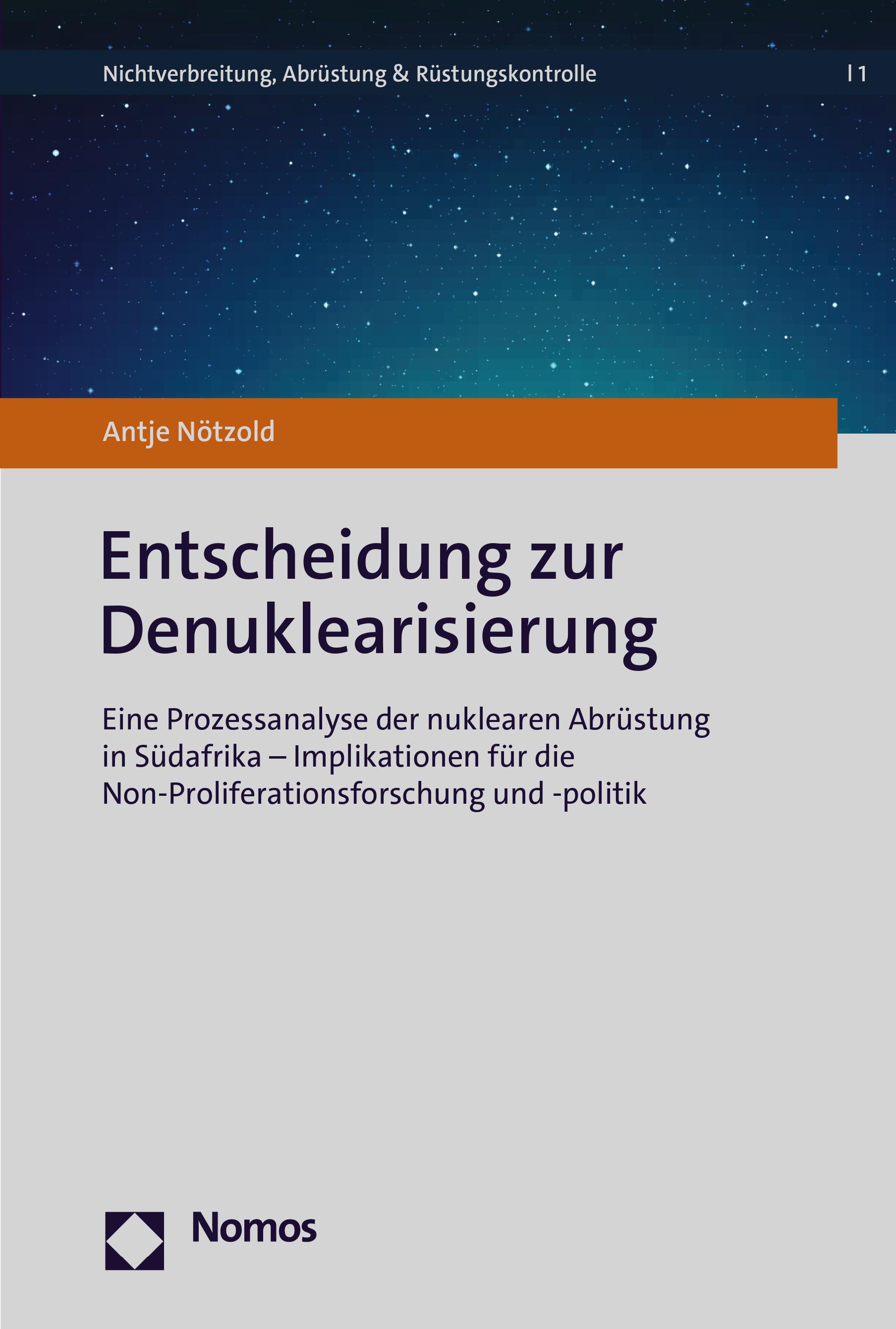
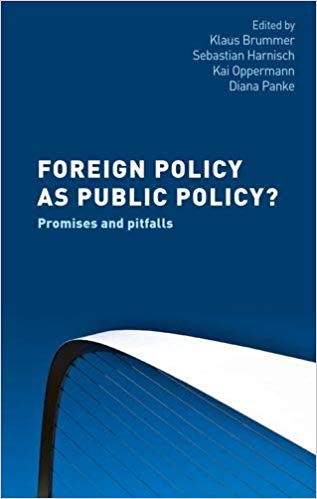
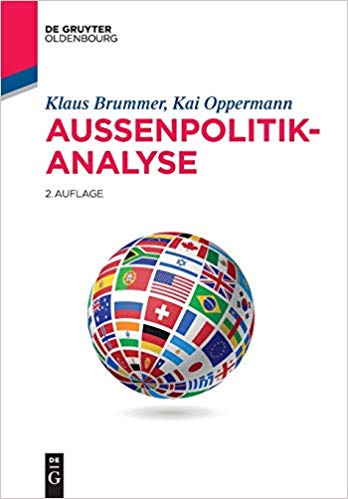

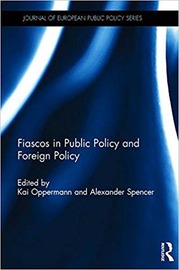

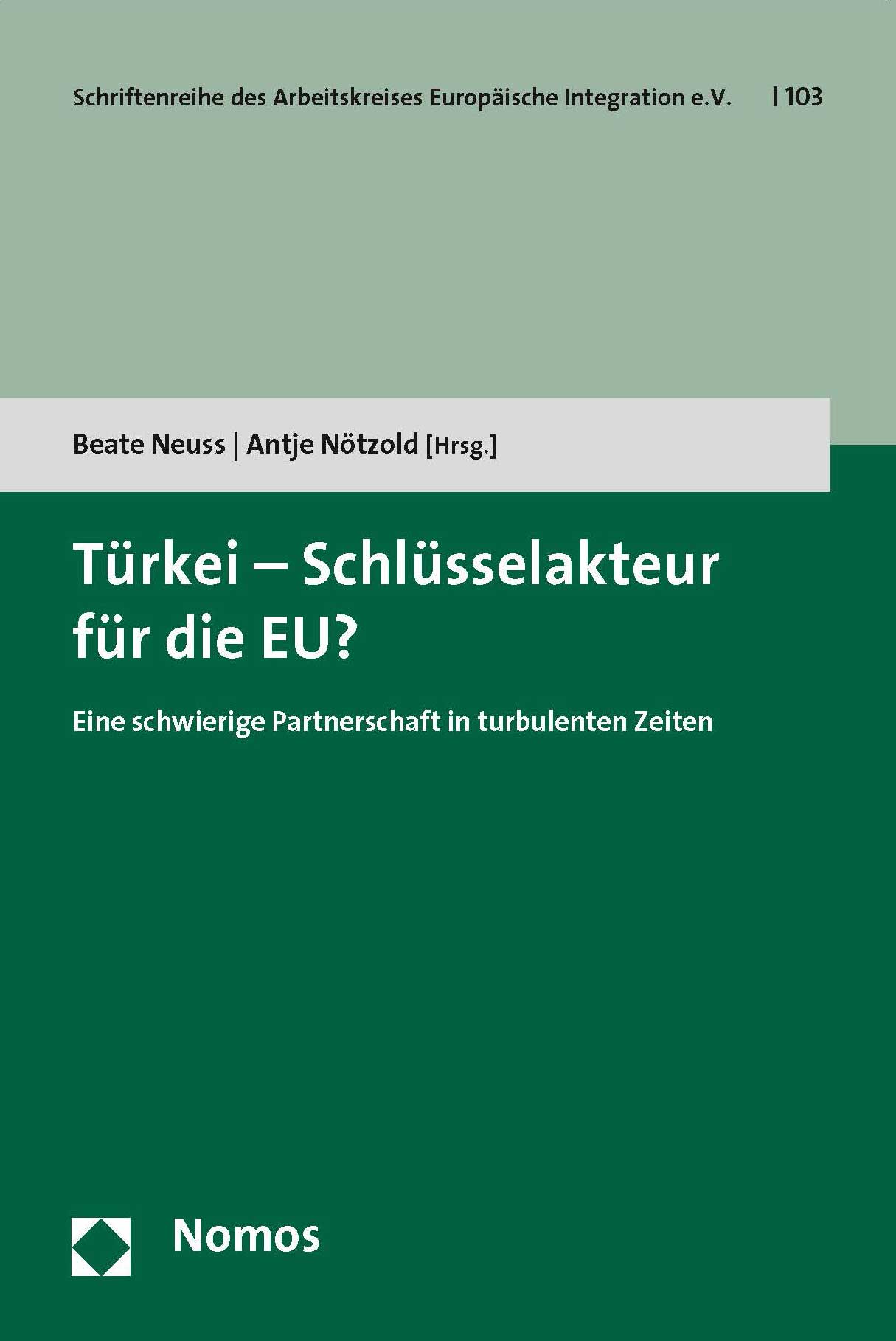
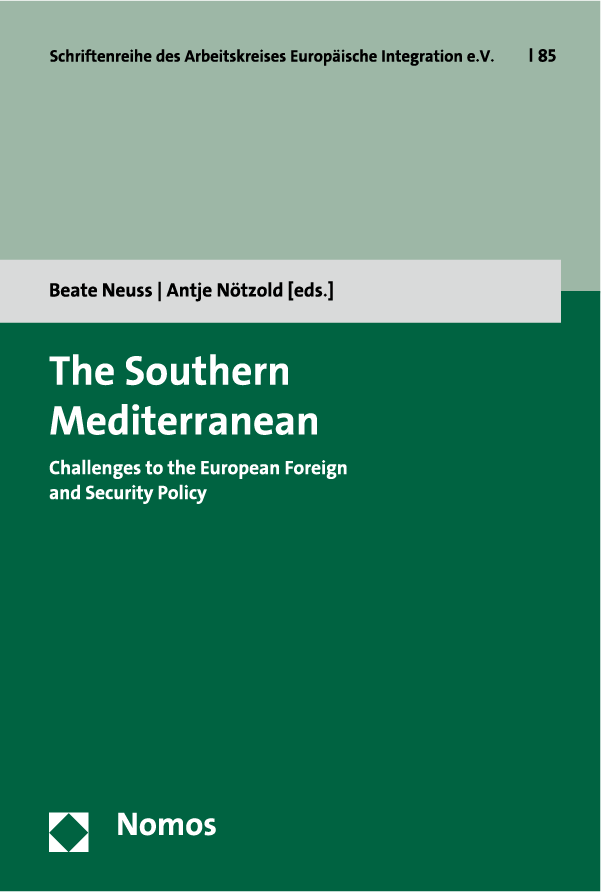
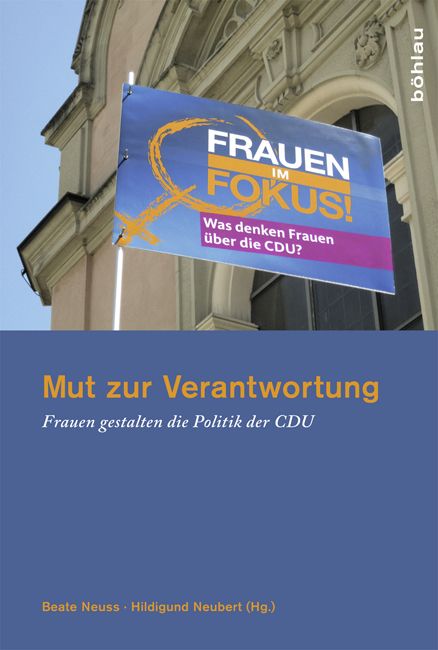
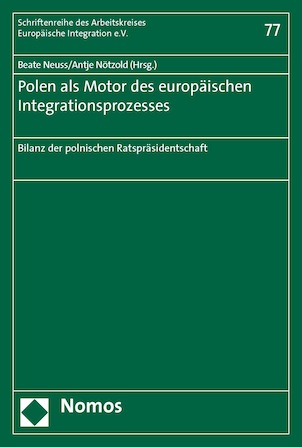
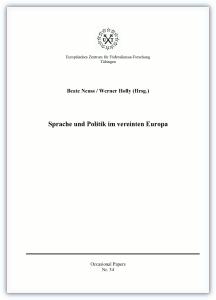
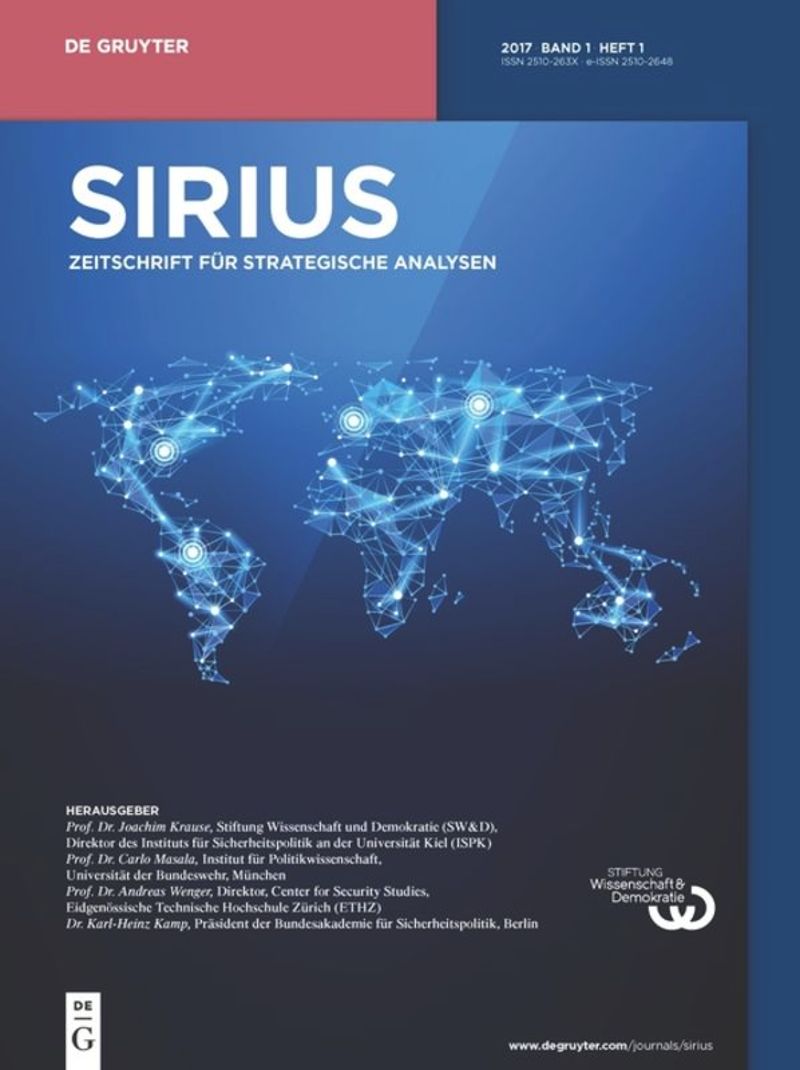
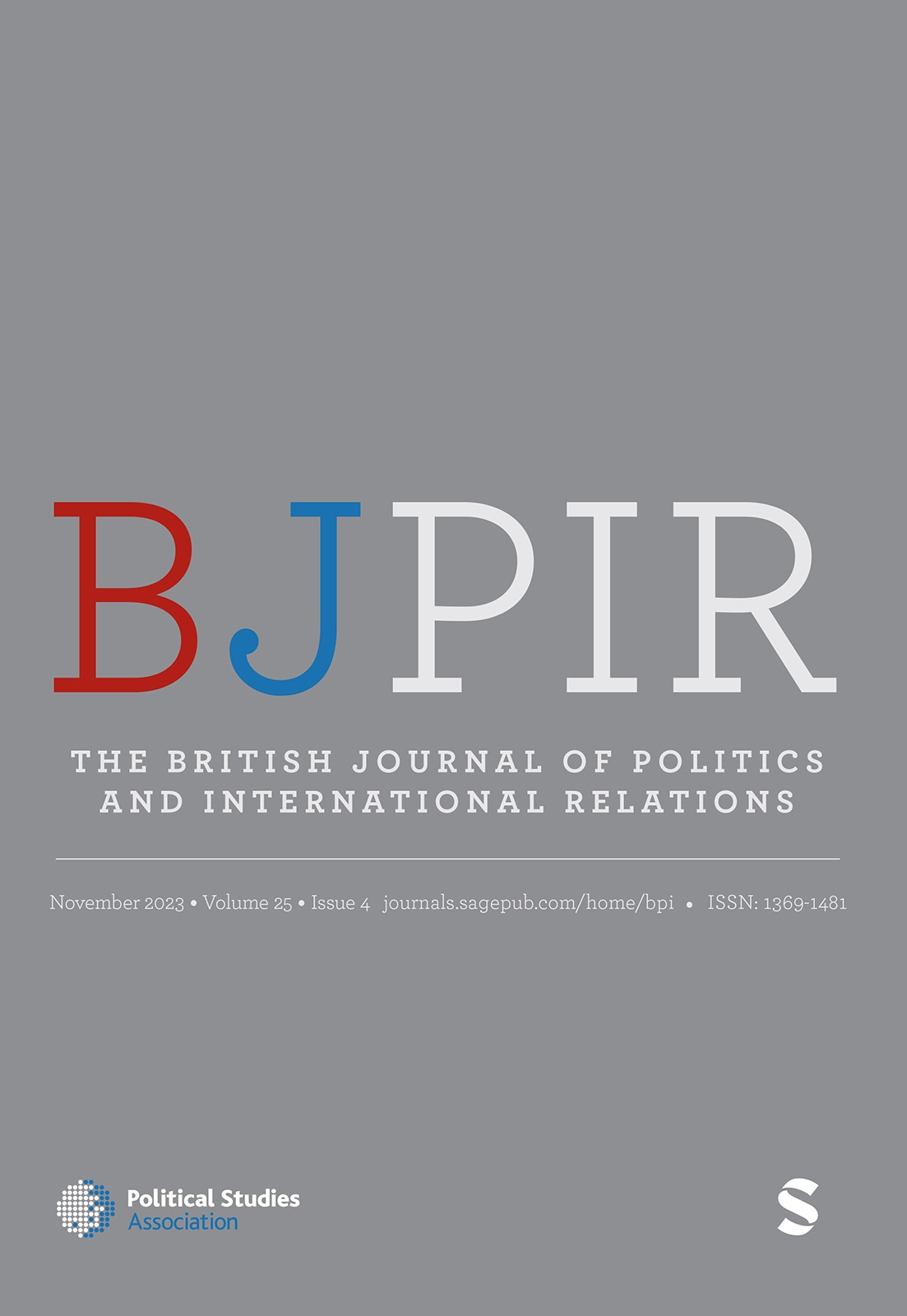
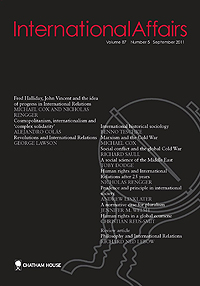
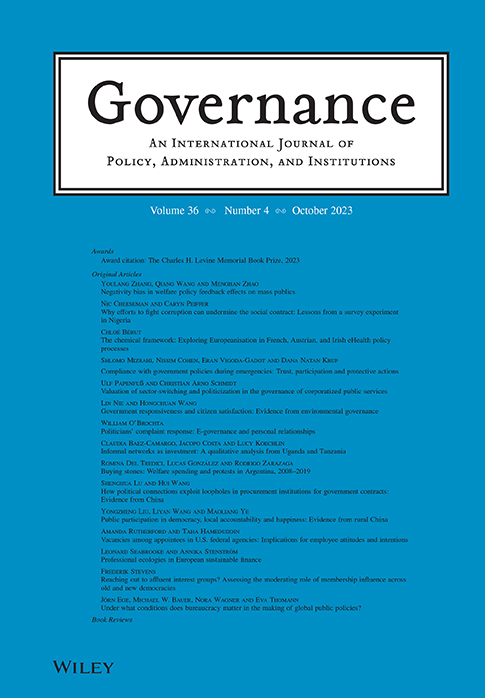
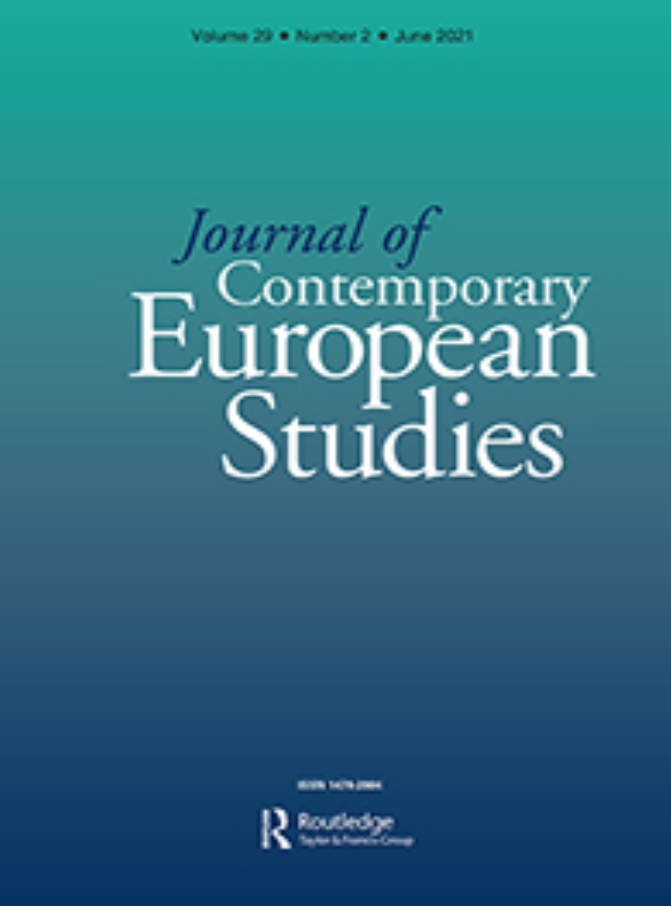
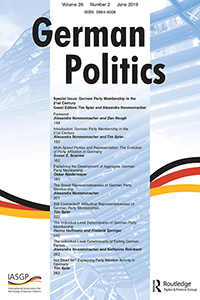
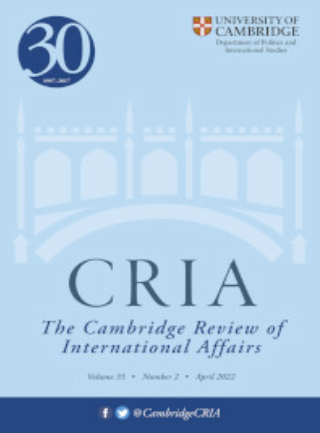
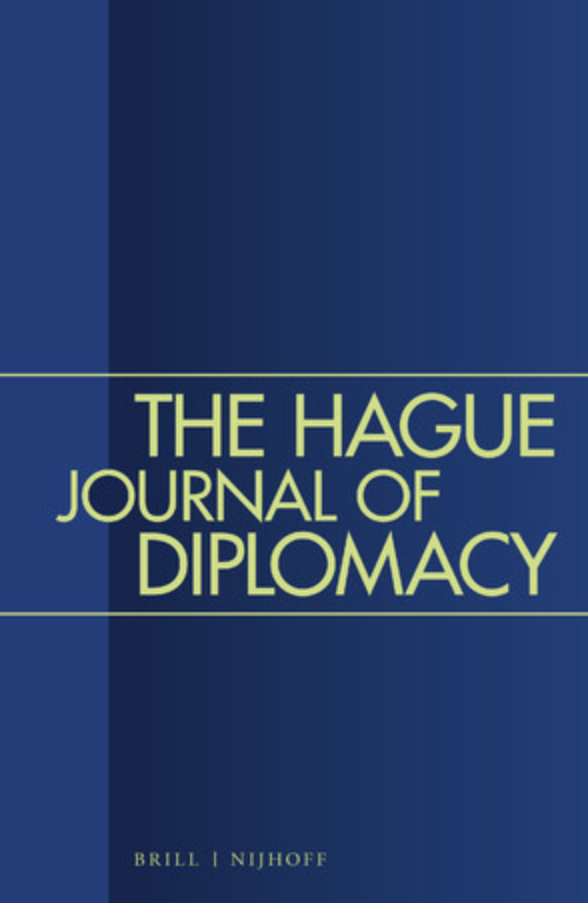
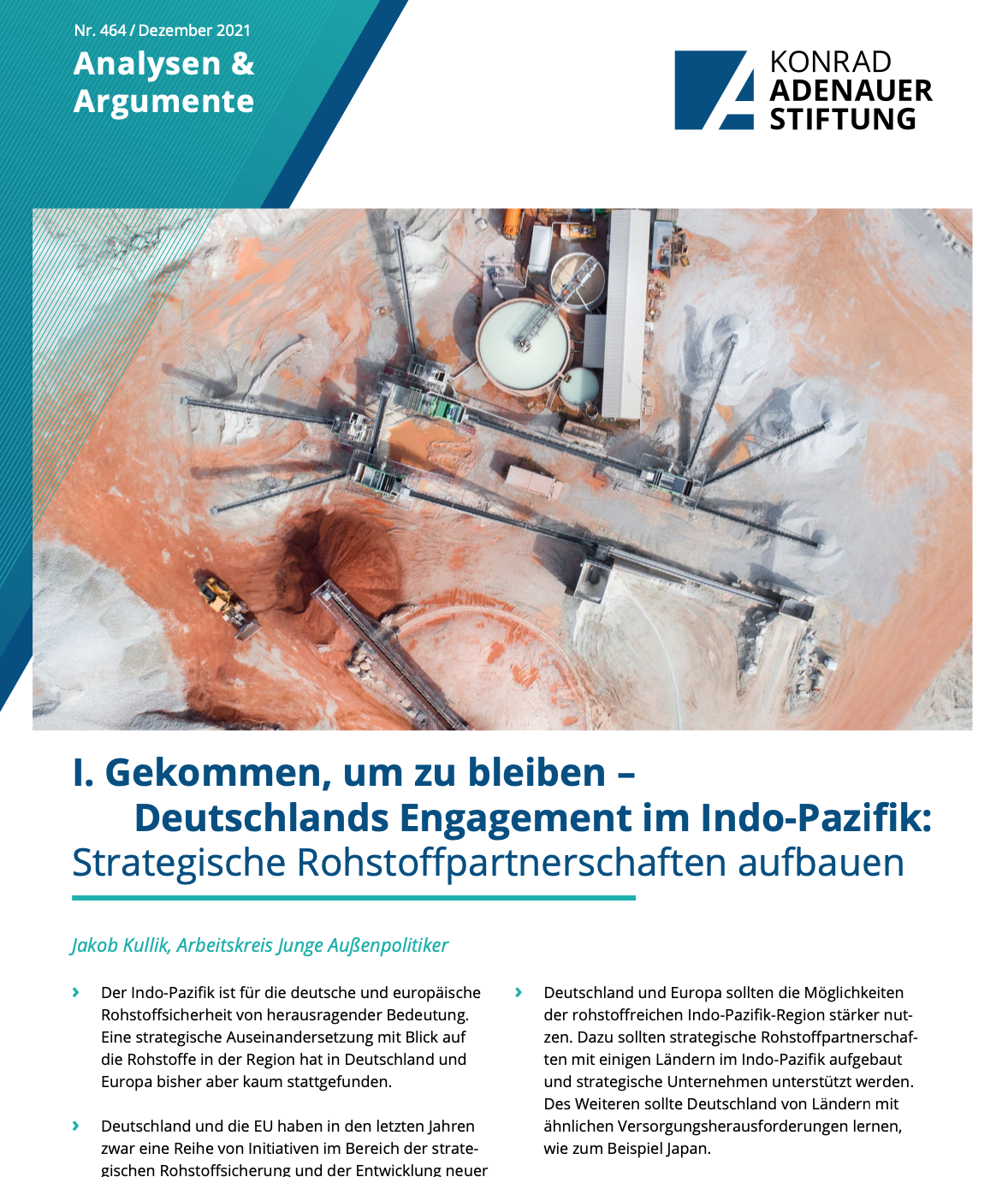
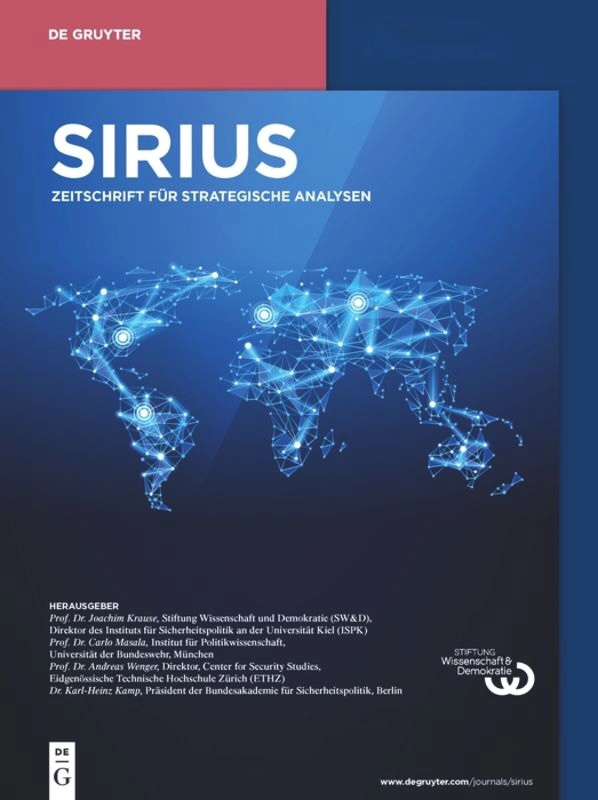
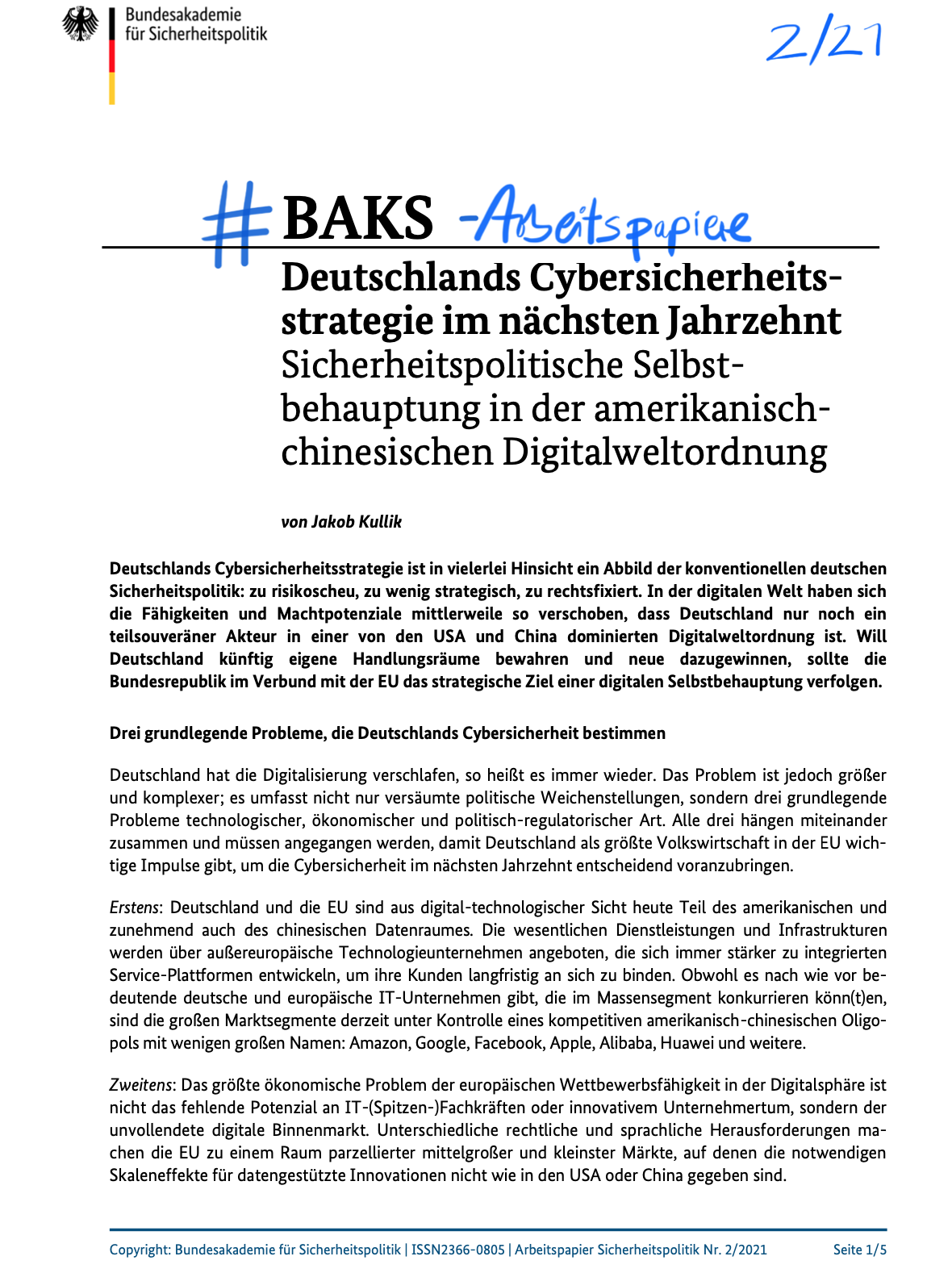
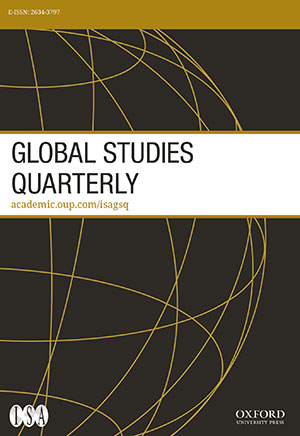
.png)
.jpg)
